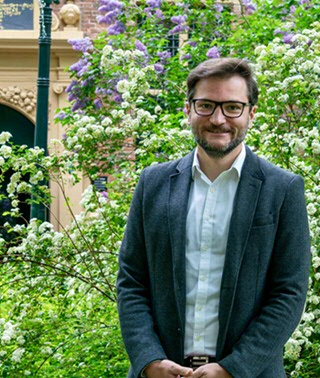Fundamentele rechten belangrijker dan ooit

Oskar Gstrein is universitair docent Internationaal en Europees recht. Hij doet onderzoek naar de invloed van digitalisering op mensenrechten. Een even dankbaar als complex onderwerp, in deze coronatijden. Gstrein maakt zich zorgen over de inperking van onze vrijheden en privacy, maar ziet ook lichtpuntjes. “Onze fundamentele rechten zijn belangrijker dan ooit.”
Door Gerard de Jong
Gstrein kijkt even om zich heen en telt: “Alleen hier op mijn bureau al heb ik vijf camera’s staan, en net zoveel microfoons,” verzucht hij, als we hem medio april via videoverbinding spreken. “Zoveel sensoren en prikkels. Voor mijn werk kijk ik vanuit het perspectief van mensenrechten naar digitale ontwikkelingen. En dat klinkt heel academisch, maar het is nu misschien wel praktischer dan ooit.”
Impact criminaliteit
De Oostenrijker studeerde recht en filosofie in zijn geboorteland. Tijdens zijn werk als onderzoeker voor de speciaal rapporteur voor privacy bij de Verenigde Naties kwam hij in Groningen terecht. Nu geeft hij les aan studenten hier en doet hij onderzoek in het Data Research Centre van Campus Fryslân. “We onderzoeken hoe we de impact van kleine criminaliteit kunnen verkleinen,” zegt Gstrein. “De criminaliteitscijfers dalen al jaren, maar mensen voelen zich steeds onveiliger. Hoe kan dat, en wat kunnen we daar aan doen?”
Corona-app is complex
Het vakgebied van de Oostenrijker bevond zich de afgelopen maanden in het oog van de storm. Kort na het uitbreken van het coronavirus begon ook Nederland met het maken van meerdere apps om de pandemie tegen te houden. Gstrein volgt het met argusogen. “De ‘appathon’ die de overheid hield was een ramp. Maar misschien is dat uiteindelijk wel goed ook. Het laat zien hoe moeilijk het is om een app te maken die én werkt, én de gebruiker ervan tegen misbruik door de overheid of misdadigers beschermt.”
Want de app is tegelijkertijd een nieuw surveillance systeem, betoogt Gstrein. “De app geeft geen antwoord op de vraag of iemand corona heeft. Terwijl de inzet van deze technologische middelen in potentie erg gevaarlijk is. Daarnaast leidt het tot sociale druk. Willen we weten of de buren of collega’s corona hebben? En hoe reageren we op mensen die de app niet willen installeren? Dat levert weer achterdocht op.”
Code is law
Daarnaast wordt te veel naar de technische kant van zo’n app gekeken, en niet naar de wettelijke en ethische kant ervan. “Code is law, heet dat. Het product wordt eerst gebouwd, en vervolgens moet nog blijken of het wel in lijn is met onze wetten en rechten. Dat zie je keer op keer gebeuren. Onze fundamentele rechten lijken een abstract gegeven, maar we hebben eeuwen aan ervaring. De kunst is zo’n appgoed te implementeren. Na 9/11 kregen we te maken met dataretentie van onze telecomgegevens. Daar worstelen we al twee decennia mee; we weten hoe men daarmee aan de haal gegaan is, onder meer door Edward Snowden. Daar moeten we van geleerd hebben, zou je zeggen. Het is frustrerend dat dit zich steeds herhaalt: we moeten blijven hameren op het belang van onze mensenrechten.”
Jongeren hebben ruimte nodig
“Wij zijn een crisis als deze niet gewend. Onze grootouders hadden met wereldoorlogen te maken. Zij waren boer, in Tirol. Mijn ouders zijn babyboomers. Mijn broer en ik zijn de eersten die de luxe hadden om te doen wat we zelf wilden. We zijn opgevoed om de wereld te veroveren. Voor de huidige generatie studenten is dat anders. Ze zijn zich veel bewuster van problematiek rondom big data, maar voelen ook constant meer druk. Ook jongeren van nu hebben ruimte nodig om te ontdekken en te groeien als persoon. Dat doen ze, wetende dat er bedrijven meekijken, terwijl geen enkele jongere zonder social media kan. Dat geeft een druk. Het dataspoor dat ze hun leven lang achterlaten is veel groter dan het onze. En ze weten niet hoe dat hen later in de staart zal bijten.”
Volgens Gstrein is het “een vooroordeel dat jongeren niet om privacy geven”, dat merkt hij ook onder zijn studenten. “Het mooie van onze fundamentele rechten is dat ze in een crisis als deze belangrijker zijn dan ooit. We kunnen twee dingen doen: we gooien ze uit het raam, of we passen ze toe op deze specifieke situatie. En blijf vragen stellen: wat betekenen privacy en vrijheid van meningsuiting in het digitale tijdperk?”
Dit artikel verscheen in Verbindt zomer 2020.
